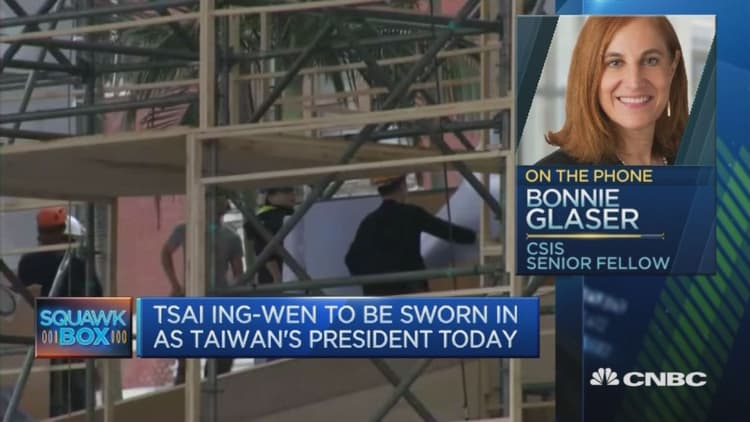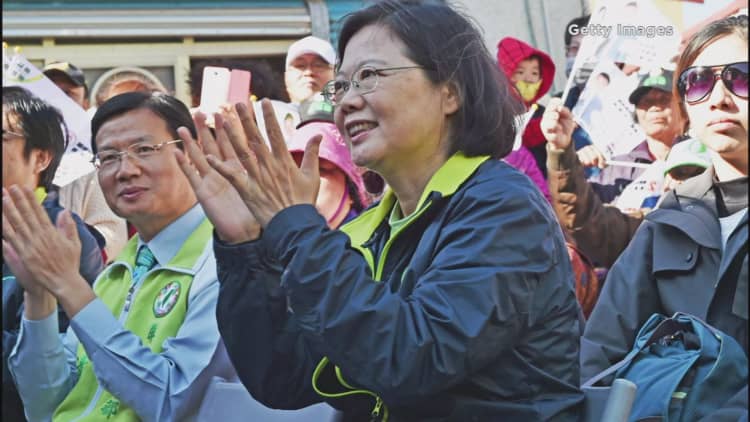


The words chosen by Taiwan's new president Tsai Ing-wen at her Friday inaugural address were likely examined carefully by Chinese officials, as she tries to maintain a stable relationship with the world's number 2 economy.
In the speech, 59-year old Tsai promised to safeguard the island-nation's sovereignty, adding that "Taiwan will play a responsible role in maintaining Cross-Strait peace and stability," Reuters reported.
That may cause rumbles in the mainland, where Beijing has been demanding Tsai to acknowledge the 'One-China' policy under a framework known as the "1992 Consensus" - a tacit understanding that the geographic territory of Taiwan belongs to mainland China, while leaving room for both countries to pursue their own interpretation of what 'One China' means.
But the '1992 Consensus' remains unpopular in Taiwan, with Tsai's Democratic Progressive Party (DPP) long rejecting the existence of the consensus, according to independent think-thank Council of Foreign Relations.
So far, Tsai has emphasized she will maintain the status quo of the island nation's amorphous relationship with China, alluding to 'One China' but not accepting it explicitly.
The language Tsai uses on Friday will be key in gauging the future of Cross-Straits relations, noted Richard Bush, senior fellow at Brookings Institution.
"China takes the position that part of the status-quo is Taiwan accepting certain political conditions about the nature of its relationship to China. For domestic political reasons, Tsai isn't willing to make those commitments in the language Beijing prefers."
While it's unlikely the DPP will push for formal, legal independence, Beijing still wants a clear statement of the DPP's intentions, he continued.
Failure to comply with Beijing's demands for political clarity could result in Chinese sanctions, according to Bush. Possible measures include a suspension of official economic interactions and a reduction in the number of Chinese tourists and students going to Taiwan, he said.
"Going South"
Investors will also pay attention to the economic policies outlined in Tsai's address.
Taiwan has increasingly pushed a 'Go South' policy that involved tapping into the Association of Southeast Asian Nations (ASEAN), in an effort to reduce its trade dependence on China.
Aside from bolstering investment and trade, 'Go South' was also focused on nurturing talent and encouraging bilateral exchanges, James Huang, head of the New Southbound Policy Office, told local media this week.
"If we don't catch up quickly, Taiwan's industry and economic advantages in ASEAN will gradually erode. This is the crux of the new southbound policy," Huang said.
The shift towards ASEAN was first promoted in the 1990s but lost traction following the 1997 Asian Financial Crisis. But it remains to be seen if ASEAN nations will co-operate with Taiwan's efforts to reinvigorate the relationship.
"I'm not too sure that her friends in Asia other than Japan are likely to take risky steps that might lead to their own problems with Beijing," Bonnie Glaser, senior fellow at the Center for Strategic and International Studies (CSIS), explained.
"Right now, Taiwan only has FTAs with Singapore and New Zealand," Glaser said. "What countries will risk Beijing's wrath by going ahead with a FTA in opposition to what the Chinese want to see? Japan might be the one country willing to do that."
Taiwan's economy entered a recession in the second half of last year and alongside a protracted slowdown in China's economy, economists widely agree that Tsai's focus will be on reviving growth, increasing jobs, shifting towards an innovation-based economy and reducing inequality.
CNBC's Huileng Tan contributed to this report.

